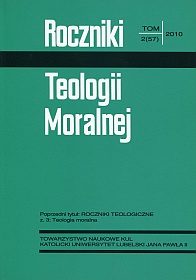Eschatologiczny wymiar teologii moralnej
Abstrakt
A man living his worldly life is also submerged in eternity, the premonition of which makes him look for various forms of prolonging his earthly existence. People erect monuments and commemorate their names in works they produce in order to lean towards the future. Acorrect system of ethics evaluating a man's behavior has to take into consideration the ultimate horizon of human life. For Christians the way to eternity is opened by the truth about the resurrection of Christ, who showed the perspective of the future glory. The aspiration to reach a full salvation in Christ motivates His followers to make the effort to grow in love.
Moral theology, undertaking the task of indicating the shape of a man’s life in the aspect of good and evil, has to take into consideration its eschatological dimension, for only then is it able to define the mystery of man in an integral way, considering both his worldly and eternal dimension. The correct anthropology should have a theological character, for it is only then that it accepts the spiritual dimension of human existence and it points to man's responsibility to God. Discovering man's aspirations to achieve the ultimate aim in the form of eternal happiness with God, a moral theologian should take into consideration the peculiar tension of a man whose life is based on the hope of eternal happiness, which – being the fruit of grace – should be accepted with a readiness to cooperate with it by performing good acts. This intensifies responsibility, as at the end a man will be judged by evaluating his love.
Bibliografia
Cannizzaro C.: Chrzest i bierzmowanie: brama do synostwa. W: Synowie w Synu. Teologia moralna fundamentalna. Red. R. Tremblay, S.Zamboni. Tł. B. Widła. Warszawa: Wydawnictwo Księży Marianów 2009 s. 347-370.
Derdziuk A.: Teologia moralna w służbie wiary Kościoła. Lublin: Wydawnictwo KUL 2010.
Gocko J.: Kościół obecny w świecie – posłany do świata. Teologiczno-społeczne aspekty posłannictwa Kościoła w świecie po Soborze Watykańskim II. Lublin: Wydawnictwo KUL 2003.
Katolo A.: Jakość życia, obsesja zdrowia i homo continuus. W: Wyzwania moralne przełomu tysiącleci. Red. J. Nagórny, A. Derdziuk. Lublin: Wydawnictwo Diecezjalne w Sandomierzu 1999 s.217-220.
Ladaria L. F.: Wprowadzenie do antropologii chrześcijańskiej. Tł. A. Baron. Kraków: WAM 1997.
Nagórny J.: Nadzieja chrześcijańska wobec wyzwań współczesności. W: Nadzieja chrześcijańska a nadzieje ludzkie. Red. J. Nagórny, M. Pokrywka. Lublin: Wydawnictwo KUL 2003 s. 63-100.
Nowosad S.: Nadzieja na „visio Dei” w życiu moralnym. W: Nadzieja chrześcijańska a nadzieje ludzkie s.143-166.
Olech W.: Polska teologia nadziei w okresie posoborowym. Lublin: Wydawnictwo KUL 2009.
Olech. W.: Sperancyjny charakter teologii moralnej. W: Świadek nadziei. Ks. prof. Janusz Nagórny twórca i nauczyciel teologii moralnej. Lublin: Wydawnictwo Diecezjalne i Drukarnia w Sandomierzu 2008 s.291-298.
Papieska Komisja Biblijna. Biblia a moralność. Biblijne korzenie chrześcijańskiego postępowania. Tł. R. Rubinkiewicz. Kielce: Verbum 2009.
Scola S., Marengo G., Prades López J.: Osoba ludzka. Antropologia teologiczna. Tł. L. Balter. Poznań: Pallottinum 2005.

